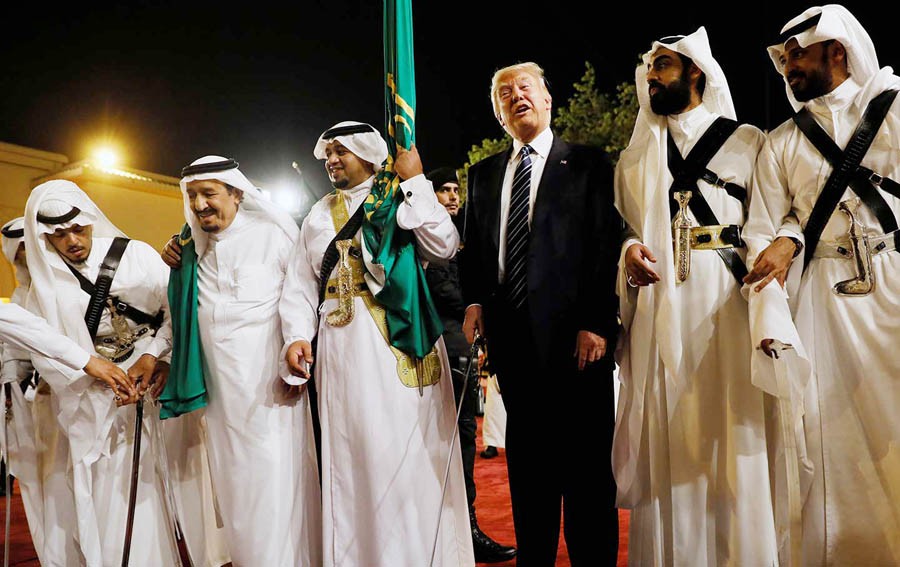
Pakistan must play its diplomatic cards carefully in the changing environment of Middle East

After attending the OIC Conference in 1994 at Casablanca, the purpose of my having a stopover at Gibraltar was to explore the philosophy of rise and fall of nations. Gibraltar educated me that how centuries back Muslims established a milestone for ruling over Spain for 700 years.
The story of rise and fall of nations is a perpetual process and only those nations can survive who are determined in their objectives and they foresee their future. If we look into the recent Muslim-Arab-American conference held at Riyadh, it looks very strange and astonishing that the objectives and agenda of this conference were not properly circulated among the invited delegates/heads of states and governments.
Even the title of this conference looks very strange -- it is called, Arab-Muslim-American Conference. What message does the term ‘Arab Muslim’ convey to the Islamic world? Have we seen such anomalies in European Union or Nato Conferences or have they ever convened a conference with the title of Christian-European-Saudi Arab Conference?
The Riyadh conference merely portrays a picture of a class room where only two keynote speakers i.e. Donald Trump and King Salman were warning the participants about their self-interpreted threats of terrorism.
The problems of the Muslim world were not brought to limelight in this conference. The brutal killings of people in Syria and the instability in Afghanistan, the plight of Rohingya Muslims in Burma and the loss of 80 thousand lives in Pakistan were not discussed at all. Every Muslim in the world has very specific spiritual and emotional attachment with the Harmain al Sharifain. But the Saudi kingdom’s policies regarding the Muslim world nowadays carry a big question mark.
Saudi Arabia’s dispute with Yemen, Iran and recently with Qatar has created chaos among the Muslims world. If we look into the history of Middle East in the Ottoman Era, we can’t ignore the role of Lawrence of Arabia who was too intelligent for Arabs and he very successfully managed to divide and disintegrate the Ottoman Empire. After the disintegration of Ottoman Empire, several independent Arab states came into being and the unity of Muslim kingdom was badly shattered that paved the way for creation of Israel.
Donald Trump’s recent visit reminds us of that era once again. Wasn’t it appropriate to raise the long lasting issue of Palestine in this so called Arab-Muslim-American Conference? Again if we look into the present situation of Syria, it has become a playground for international players, where only innocent Syrians are brutally killed. Is Syria being penalised for challenging Israel?
Trump’s visit to Riyadh raises many questions about the future of Middle East as the aftershocks of his visit have been felt in the form of isolation of Doha. The heads of state participating in the conference didn’t even bother to raise the problems of Muslim world rather they were impatient to shake hands with Donald Trump and King Salman.
Saudi Kingdom has signed an agreement of billion dollars to buy weapons from America and everyone thinks that who will use these weapons and against whom? America only aims to sell its arsenal, reach Arab oil and protect Israel. Turkey’s participation in this conference will make her suspicious in Moscow’s eye that has recently created a soft corner for Ankara.
The interpretation of terrorism explored at Riyadh conference and its attribution towards Iran is very alarming. Iran has its own importance in the region and being declared a source of terrorism by Riyadh is not a healthy message for the Muslim Ummah. The phenomenon of terrorism has become very complicated and state and non-state actors are involved in this evil practice since long. The Riyadh conference has only focused on the concept of terrorism and the tragedy is that only Iran is targeted with no mention of Israel and India.
Israel is persistently committing brutal terrorism in Gaza Strip and the world has not yet forgotten the massacre of innocent Palestinian children in Sabra and Shatila camps. The same is the case with India, where state terrorism is at peak in Indian held Kashmir.
It is the appropriate time for Iran to revisit its policies with special reference to Middle East issues. The isolation of Iran would not bring harmony in the region rather radical feelings would be fanned.
Pakistan being a neighbour of Iran and an effective member of the Muslim community must be very careful in this changing environment.